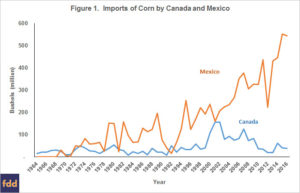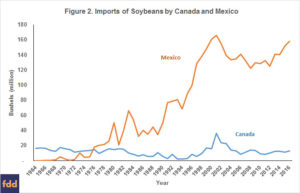Gary Schnitkey, Kathy Baylis, and Jonathan Coppess indicated on Friday at the farmdoc daily blog that, “Recent news from the Trump Administration has sowed confusion about the President’s intentions with respect to the North American Free Trade Agreement (NAFTA). Early this week, President Trump suggested that the United States would pull out of NAFTA. Later in the week, he said the US will stay in NAFTA, but that the agreement would be reopened for renegotiations. NAFTA is a trade agreement between the Canada, Mexico, and the United States and was put in place in 1994. For Midwest farmers, renegotiating NAFTA is a concern because Canada and Mexico import significant amounts of corn and soybeans.”
The update explained that, “Mexico is a substantially larger market for corn than Canada. From 1991 to 1993, Mexico imported 67 million bushels of corn. Similar to Canada, Mexico’s imports of corn increased after 1994. From 2014 to 2016, Mexico imported an average 513 million bushels of corn per year.”

Schnitkey, G., K. Baylis, and J. Coppess. “A Reminder on NAFTA and Agriculture.” farmdoc daily (7):78, Department of Agricultural and Consumer Economics, University of Illinois at Urbana-Champaign, April 28, 2017.
The farmdoc item noted that, “Similar to corn, soybean imports into Canada and Mexico have substantially increased since the passage of NAFTA in 1994.”

Schnitkey, G., K. Baylis, and J. Coppess. “A Reminder on NAFTA and Agriculture.” farmdoc daily (7):78, Department of Agricultural and Consumer Economics, University of Illinois at Urbana-Champaign, April 28, 2017.
Schnitkey, Baylis, and Coppess explained that, “Exports are important sources of use of corn and soybeans, and particularly so for soybeans. Mexico and Canada are important customers of U.S. products. Potential disruptions in the movements of grains could have negative impacts on prices.
“The importance of export to domestic agriculture is likely to grow in the future. Technological changes will continue to occur in the United States, leading to higher yields and more corn and soybean supply. At this point, one of the areas of continued growth in use of U.S. corn and soybeans is likely to be exports. If exports do not grow, negative impacts can be anticipated for corn and soybean prices.
“Being a reliable supplier is an important characteristic of agricultural exporters. If an exporter is not viewed as reliable, other countries may look elsewhere for grain supplies. Some reactions along these lines have taken place because of trade discussions coming from the U.S. Early in 2017. For example, Mexico has threatened to place a tax on U.S. corn imports in response to the President’s comments about NAFTA and has also begun to buy corn from Argentina and Brazil. Whether these efforts have long term negative impacts on U.S. agricultural trade remains to be seen.”

